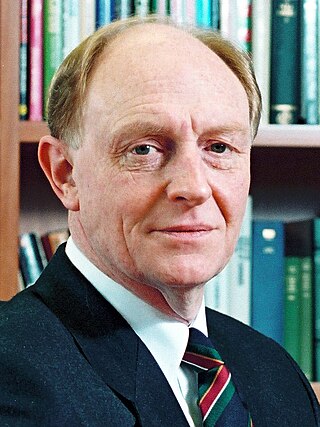
Jonathan Lucas Hunt is a New Zealand politician, and was New Zealand's High Commissioner to the United Kingdom from 2005 to March 2008. He formerly served as Speaker of the New Zealand House of Representatives. He is a member of the Labour Party, and was until his retirement in 2005 the longest-serving MP in Parliament. Hunt is a member of the Order of New Zealand, New Zealand's highest civilian honour. Hunt was given the nickname the "Minister for Wine and Cheese" after his well-known liking of the combo.

Thomas Frederick Peart, Baron Peart, PC was a British Labour politician who served in the Labour governments of the 1960s and 1970s and was a candidate for Deputy Leader of the Party.

Scottish Labour, officially the Scottish Labour Party, is the part of the UK Labour Party active in Scotland. Ideologically social democratic and unionist, it holds 22 of 129 seats in the Scottish Parliament and 2 of 59 Scottish seats in the House of Commons. It is represented by 262 of the 1,227 local councillors across Scotland. The Scottish Labour party has no separate Chief Whip at Westminster.
The 1983 Labour Party leadership election was an election in the United Kingdom for the leadership of the Labour Party. It occurred when then leader Michael Foot resigned after winning only 209 seats at the 1983 general election, a loss of 60 seats compared to their performance at the previous election four years earlier. This was the worst showing for Labour since 1935 until 2019.
The 1980 Labour Party leadership election was held following the resignation of James Callaghan, who had been Prime Minister from 1976 to 1979 and had stayed on as leader of the Labour Party for eighteen months in order to oversee an orderly transition to his favoured successor, Denis Healey, over his own deputy Michael Foot. However, during this period the party had become bogged down in internal arguments about its procedures and future direction.
The 1963 Labour Party leadership election was held following the death of Hugh Gaitskell, party leader since 1955. He died on 18 January 1963 and was succeeded by deputy leader George Brown.

James Anthony Kelly is a Scottish politician who has served as General Secretary of the Scottish Labour Party since 2021. He was a Member of the Scottish Parliament (MSP) for the Glasgow region between 2016 and 2021, having previously been MSP for Rutherglen from 2007 to 2016.

The Glasgow Queen's Park by-election, 1982 was a parliamentary by-election held on 2 December 1982 for the House of Commons constituency of Glasgow Queen's Park.
The Commons members of the Parliamentary Labour Party (PLP) elected 19 members of the Shadow Cabinet from among their number in 2010. This follows the Labour Party's defeat at the 2010 general election, after which the party formed the Official Opposition in the United Kingdom.
Elections to the Labour Party's Shadow Cabinet took place in October 1995, at the beginning of the 1995/6 session of parliament. Under the rules then in effect, the Commons members of the Parliamentary Labour Party elected 19 members of the Official Opposition Shadow Cabinet, who were then assigned portfolios by the leader. The Labour peers elected the Leader of the Opposition in the House of Lords. In addition, the Leader of the Labour Party and Deputy Leader were members by virtue of those offices. With this election, for the first time, the role Opposition Chief Whip was simply another portfolio to be handed out rather than an office separately elected by the PLP. The 19 elected members of the Shadow Cabinet were the ones with the largest number of votes. MPs were required to vote for at least four women, but women were not necessarily guaranteed places in the Shadow Cabinet.

Neil Kinnock was Leader of the Labour Party and Leader of the Opposition from 2 October 1983 to 18 July 1992. He convincingly defeated Roy Hattersley, Eric Heffer, and Peter Shore in the 1983 leadership election, which was prompted by Michael Foot's resignation following the disastrous general election result earlier that year. Kinnock's period as Leader encompassed the bulk of the Thatcher premiership and the first two years of the Major premiership. Kinnock resigned in 1992 after losing his second election as Leader.

Michael Foot was Leader of the Opposition from 4 November 1980, following his victory in the 1980 leadership election, to 2 October 1983, when he was replaced by Neil Kinnock at the 1983 leadership election. The 1980 leadership contest was triggered by James Callaghan's loss at the 1979 general election, and the 1983 contest by Foot's own disastrous defeat in the 1983 general election.
Elections to the Labour Party's Shadow Cabinet occurred on 14 June 1979, following the Party's fall from power at the May general election that year. In addition to the 12 members elected, the Leader, Deputy Leader, Labour Chief Whip, Labour Leader in the House of Lords, and Chairman of the Parliamentary Labour Party were automatically members.
Elections to the Labour Party's Shadow Cabinet took place on 4 December 1980, having been delayed due to the October election of new Party Leader Michael Foot. In addition to the 12 members elected, the Leader (Foot), Deputy Leader, Labour Chief Whip, Labour Leader in the House of Lords, and Chairman of the Parliamentary Labour Party were automatically members.
Elections to the Labour Party's Shadow Cabinet took place on 19 November 1981. There were 15 posts, rather than 12 as in previous years. In addition to the 15 members elected, the Leader, Deputy Leader, Labour Chief Whip, Labour Leader in the House of Lords, and Chairman of the Parliamentary Labour Party were automatically members.

The Social Democratic Party (SDP) was a centrist to centre-left political party in the United Kingdom. The party supported a mixed economy, electoral reform, European integration and a decentralised state while rejecting the possibility of trade unions being overly influential within the industrial sphere. The SDP officially advocated social democracy, but its actual propensity is evaluated as close to social liberalism.
Elections to the Labour Party's Shadow Cabinet were announced on 28 October 1983. In addition to the 15 members elected, the Leader, Deputy Leader, Labour Chief Whip, Labour Leader in the House of Lords, and Chairman of the Parliamentary Labour Party were automatically members.
New Zealand political leader Bill Rowling assembled a shadow cabinet system amongst the Labour caucus following his position change to Leader of the Opposition in 1975. He composed this of individuals who acted for the party as spokespeople in assigned roles while he was leader (1975–83).
Elections to the Labour Party's Shadow Cabinet occurred in November 1958. In addition to the 12 members elected, the Leader, Deputy Leader, Labour Chief Whip, Labour Leader in the House of Lords, and Labour Chief Whip in the House of Lords were automatically members.
Elections to the Labour Party's Shadow Cabinet occurred in November 1989. For these elections the Shadow Cabinet was expanded from 15 to 18 seats and, for the first time, MPs had to cast at least three votes for women.








